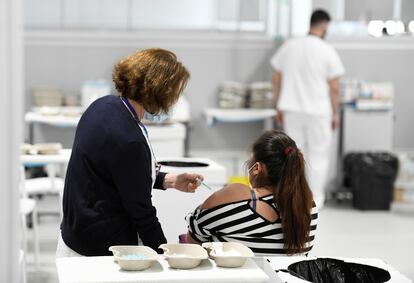Spain’s Covid-19 vaccination drive: nearly 40% of population has received at least one shot
The Health Ministry is expecting a shipment of 4.6 million vaccine doses this week, the largest delivery since the start of the immunization campaign


Spanish authorities are aiming to have 10 million people fully vaccinated against Covid-19 by the end of this week. So far, the figure is 9.2 million, but a new shipment of 4.6 million doses, the largest to date, is expected to arrive in the coming days.
Spain’s mass immunization campaign has reached cruising speed and nearly 40% of the population has had at least one shot, while 19.4% has the full protection offered by a Covid-19 vaccine. The most-vulnerable members of society have been largely protected: 95% of people over 60 have had at least one dose. Regional governments are now completing the immunization of those in their 60s, and calling in the 50-to-59 age group.
Experts, however, are still concerned about a few remaining issues.
“We have made progress in the pace of vaccination, but we cannot afford the slightest pause or show too many signs of complacency,” warned Daniel López-Acuña, a former director of emergencies at the World Health Organization (WHO).
One matter for concern is the administration of the second dose to essential workers under 60 who have already received a first shot of the Oxford-AstraZeneca vaccine. Following a prolonged pause while authorities considered the risks involved in using this medication on younger people, due to links with rare blood clots, the government finally announced that essential workers would get a second shot of Pfizer – unless they expressly refused and asked for a second dose of AstraZeneca instead.
Statistics show that most people are opting to continue with the Anglo-Swedish vaccine, a decision that questions the credibility of the health authorities. “We have a very intelligent population that paid attention to the scientific authorities, not the political authorities,” noted Fernando Moraga-Llop, vice-president of the Spanish Vaccinology Society, alluding to the fact that the use of AstraZeneca was supported by the European Medicines Agency (EMA) and numerous scientific groups.
It could also pose a supply problem if AstraZeneca does not send the shipments that it has committed to. Although 12.2 million doses were expected to arrive in the third quarter of the year, so far only six million have been shipped.
Meanwhile Janssen, a unit of pharmaceutical giant Johnson&Johnson, had announced it would send five million doses before June 30, but so far only 576,000 have arrived, and health authorities are still deciding whether to use this single-shot vaccine – which has also been linked to rare blood clots – on the 40-to-49 age group.
Some regions, such as the Canary Islands and Castilla-La Mancha, are already immunizing people in their 40s. The Balearic Islands will start this week, Navarre will do so next week, and the Valencia region has given itself a start date of June 17. This age group is getting either the Pfizer-BioNTech vaccine or Moderna shot.
Authorities are also trying to reach out to hard-to-locate groups such as the homeless, irregular immigrants and seasonal fruit pickers. For these groups, the Health Ministry has authorized the use of the Janssen vaccine, irrespective of age, given it only requires one dose.
With additional reporting by Ferran Bono, Lucía Bohórquez, Jesús A. Cañas, Pedro Gorospe, Juan Navarro, Guillermo Vega, Sonia Vizoso, Eva Saiz, Bernat Coll and Isabel Valdés.
English version by Susana Urra.
Tu suscripción se está usando en otro dispositivo
¿Quieres añadir otro usuario a tu suscripción?
Si continúas leyendo en este dispositivo, no se podrá leer en el otro.
FlechaTu suscripción se está usando en otro dispositivo y solo puedes acceder a EL PAÍS desde un dispositivo a la vez.
Si quieres compartir tu cuenta, cambia tu suscripción a la modalidad Premium, así podrás añadir otro usuario. Cada uno accederá con su propia cuenta de email, lo que os permitirá personalizar vuestra experiencia en EL PAÍS.
¿Tienes una suscripción de empresa? Accede aquí para contratar más cuentas.
En el caso de no saber quién está usando tu cuenta, te recomendamos cambiar tu contraseña aquí.
Si decides continuar compartiendo tu cuenta, este mensaje se mostrará en tu dispositivo y en el de la otra persona que está usando tu cuenta de forma indefinida, afectando a tu experiencia de lectura. Puedes consultar aquí los términos y condiciones de la suscripción digital.








































